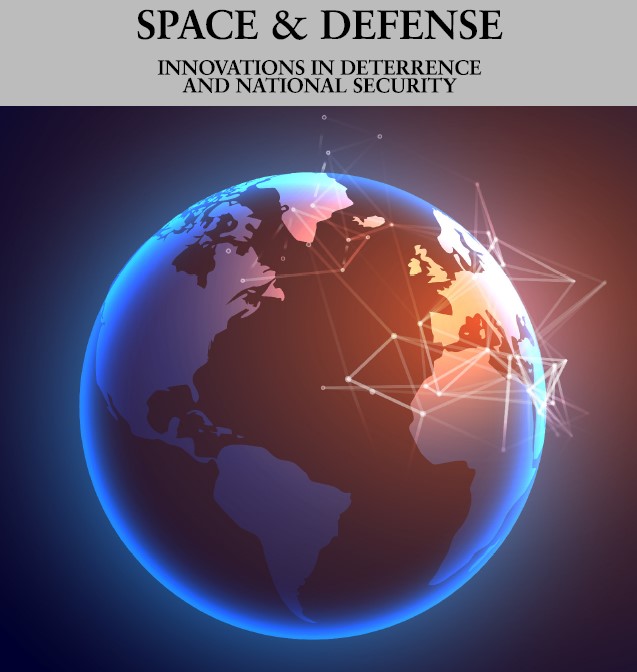Space and Defense

Winter 2014
Editor’s Note Vol. 7 No.1
Volume 7 of Space & Defense marks a broadening of our editorial interest. We still aspire to be the premier journal for innovative ideas about military, civil, or commercial space that compel us to rethink defense of the nation. Research in this rapidly evolving policy area celebrates the Air Force’s vital contributions to space studies dating back to the service’s inception sixty-six years ago. Yet, our heritage at the Eisenhower Center for Space and Defense Studies, U.S. Air Force Academy touches a wider range of concerns. It was, after all, USAFA’s Department of Political Science, the parent department of this Center, which in 1965 first conceived and published a graduate level textbook on American Defense Policy (ADP).
President Eisenhower, from whom the Center takes much inspiration, was a founding father of both the Air Force Academy and the U.S. Space Program. A most interesting aspect of his rich legacy as Commander-in-Chief, including his famous Farewell Address, was his clarion call for the nation to think through its defense in a transformed world. The appeal of Soviet ideology in recovering Europe and post-colonial states, combined with the advent of nuclear fusion bombs and ballistic missiles, changed dramatically the old calculus of national security. Eisenhower’s administration picked up a wartime cue laid down by the former Office of Scientific Research and Development under President Roosevelt and reached out before the next hot war, sponsoring research at influential 1950s think tanks like RAND and at leading universities—not only for technology development but new knowledge in the social sciences, including economics and politics.
Certainly, professors and researchers could not simply deliver all the right policy solutions to end the Cold War, but the intellectual effort, particularly during the late- 1950s and early-1960s, transformed both the discipline of Political Science and the practice of policy making in positive ways, which in turn helped America meet novel defense challenges. The inkling that we may be entering another transformative period marked by globalized economic structures and security threats—this time with American values faltering abroad, despite, or perhaps in part because of, the lack of a recognizable superpower rival—prompted us several years ago to create the Center and launch this research journal on Space & Defense.
Of course, our home military service and our main patron, the U.S. Air Force, remains intensely interested in the future of space. We suspect that welcoming researchers from academia, government, and industry who share this interest and would take it as a novel vantage point from which to pursue broader questions of national defense in a world transformed—questions upending the old security calculus—will before long advance our original discussion on space.
Twenty-first century domains such as space, cyber, and violent non-state networks remain distinct from one another, but the logics of dealing with them are connected in subtle ways, which we believe will become more intriguing and useful as we explore. For example, because globalization shapes today’s security priorities, several contemporary national defense concerns force us to consider tensions between transnational cooperation and inter-state competition; among civil, commercial, and military activities; and between traditional versus bounded or pooled sovereignty. We note how certain Cold War concepts such as deterrence frequently appear in these pages as they apply to space; elsewhere deterrence has come up for cyber and again for terrorism. All these burgeoning literatures benefit from intellectual bedrock created during the Eisenhower era, but they have not, as yet, learned much from one another. This is where our journal can make a difference, cultivating some articles without space in the title that nevertheless help us think about new domains for strategic competition or security cooperation and, by the same token, articles with space in the title that urge us to contemplate arenas beyond space where defense policy makers face political, economic, organizational, and technological dilemmas in the new world opening before them.
This issue of Space & Defense, the first with our new editorial direction in mind, offers three peer-reviewed features, along with a special report from the Eisenhower Center and another installment of Publisher’s Corner. In the lead article, SAIC (Science Applications International Corporation) analysts Justin Anderson, Walt Conrad, and Sarah Jacobs Gamberini respond to the globalization Zeitgeist in current space policy. They follow their previously published article on proposals from China, Russia, and Europe to prohibit weaponization of space with a fresh evaluation of arms control prospects involving emerging space powers, emphasizing potential contributions from India, Brazil, and South Africa. Jonty Kasku- Jackson of the National Security Space Institute in Colorado Springs widens the arc of cooperation from multilateral agreements to transnational legal codes. She explores the value of international liability law, presently observed by civil and commercial satellite operators, for supplementing national deterrence polices against attacks on space assets, including military satellites. Our final feature, from Adam Lowther of the Air Force Research Institute and Casey Lucius of the Naval War College, serves as a point of departure, a marker for the limits on cooperation in space once the United States has settled, concretely and explicitly, upon its vital interests. This issue concludes with two products from the Eisenhower Center. The first is a special report, which was commissioned last year by the Office of the Secretary of Defense (OSD) in order to help the Department think through future policy dilemmas of Space Verification. The last item is our eagerly anticipated “Publisher’s Corner.” Former diplomat and founding director of the Eisenhower Center, Ambassador Roger Harrison, reflects on why discourse—specifically, how the policy machinery chooses to name a new national security domain such as “cyberspace”— matters so much when allies and adversaries alike sense the world transforming under their watch.
Damon Coletta, USAFA
Schuyler (Sky) Foerster, USAFA
January 2014
Whole Issue
Space and Defense – Volume Seven – Number One – Winter 2014
Space and Defense Journal
